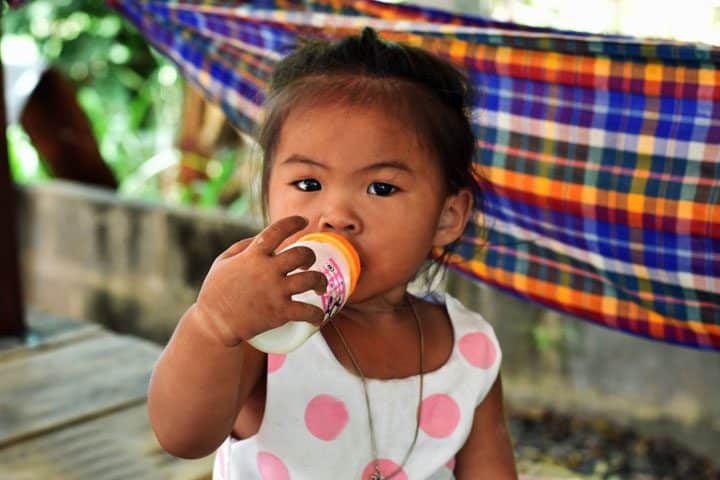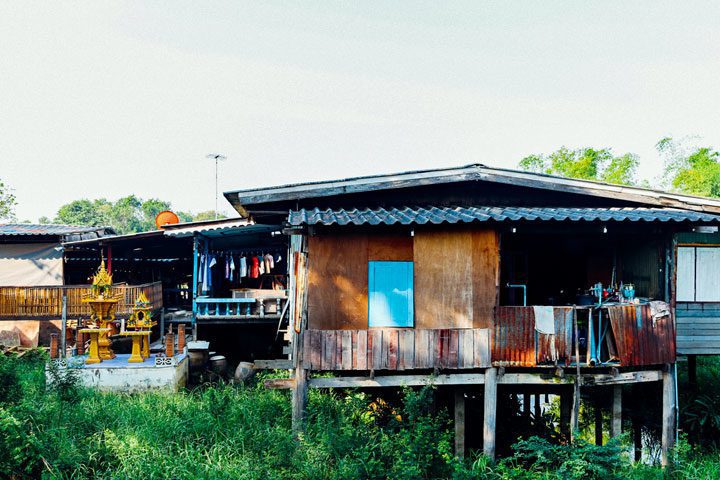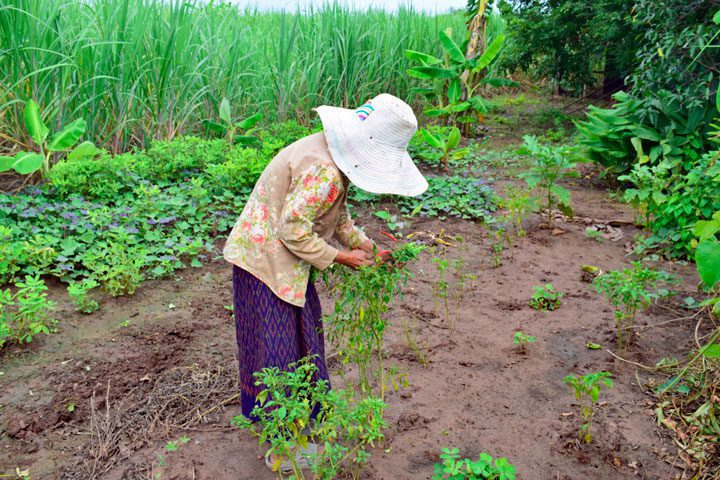Isan Satisfaction (Part 1)
It is still early, the morning twilight has just set in. It looks like it's going to be a beautiful day, it might get too hot later, but that can't hurt Maliwan. At the moment it is still wonderfully fresh, the dew that is everywhere on the green gives cooling. No movement is to be seen anywhere, while Maliwan steps to the back of the garden towards the pump house, housemates and neighbors are still asleep. The pump house is actually two brick buildings next to each other with a metal roof and the space between the two structures is also roofed over. There is an easy to clean concrete floor. Maliwan has taken over this spot, where she steams rice every morning. On a charcoal fire with a pot of water on it, on top of this, in precarious balance, a basket woven from bamboo that is closed at the top. She doesn't mind that it's quite messy here, she thinks it's quite cozy. A short piece of tree trunk is her seat and while the delicious smells of steaming rice make her hungry, she looks around dreaming a bit.
Around her she sees the garden, big enough for many different fruit trees like banana, mango, manao, coconut and others. The spontaneous grass, which is cultivated a bit by simply trimming the weeds that grow between it, makes it dust-free here and at times smells wonderfully because of the wild flowers and others that are allowed to bloom. In the furthest garden corner is her herb garden, next to which she also grows some vegetables. And she can see pleasantly far away, fortunately there is no wall around the garden, only a fence in coarse-mesh steel wire between which grow green bushes that are kept at man's height. On the north side is her brother's house a hundred and fifty meters away, a little closer between a few tall trees with a broad canopy of leaves his cowshed where the three cattle are still sleepily ruminating. On the west side is the rickety house of a distant uncle. From the east side she can see for miles, pick trees between the rice fields with those typical little dams. In the foreground is the large family pond where she had ordered her brother to stretch a large net between bamboo poles. Here she now breeds fish on a slightly larger scale.
When Maliwan looks south, she sees her home. Large and high due to the floor and the gable roof with tiles on it, she thinks that is really chic. Aluminum windows and doors with steel ornaments that give it a safe feeling. There is also an outdoor kitchen at the rear and she has to smile. Yes, inside the house there is a kitchen that is fairly modern and equipped to Western desires. Outside against the rear facade, equipped with only a roof and low side walls, an extra open kitchen in Isaan style. But once again furnished: storage cupboards, gas fire, sink in stainless steel. All fine, Maliwan thinks with satisfaction. And yet she prefers to cook her rice here in the morning, the old-fashioned way, on the floor, on a charcoal fire. She often comes here to bake meat or roast fish. It makes her a bit nostalgic, the more primitive makes her think of the past.
Back then, everything was… well, she doesn't know very well. Better? Worse? In any case, life is more difficult, poorer. But not really worse: there was the family, the parents, grandparents, brother and sisters. Neighbors in the same situation, but that brought a lot of solidarity. Yes, the home-made lao kao was also there, but different, usually only on occasion. Traditions were more honored, life was also slower, simpler. Yet at the time she soon felt that she wanted to change. The poverty made her angry and rebellious. Maliwan is the eldest of four children and was quickly made aware of her responsibilities. She was four when her little brother came into the world, and when he died after two years, she often had to look after him, keep an eye on him, make sure nothing happened to him. From then on she was given even more responsibilities: the buffaloes. Accompanying them to grassy areas in the morning, and if it was far she had to stay with them so that nothing would happen to the animals, the only capital of the family. Now that was hardly a problem in those years, the buffaloes found good places to graze by themselves, there was no traffic. A few motorcycles, no one had a car in the village and there was no heavy traffic of passing cars. The bell of the village temple rang regularly so she always knew when it was time to go home. Then came the moments to play a little with the other children.

moolek skee / Shutterstock.com
To kill time in the middle of those fields, she always carried a fine-meshed net into which she put the edible insects she collected. Very occasionally she could catch a snake, although her parents insisted not to, too dangerous, she actually had too little experience to recognize poisonous snakes, but she did it again and again, her father was fond of snake meat. Towards the rice harvest, more loot was available: the rats that nest in the dikes around the fields are then fully grown. She received help from the family dog who always accompanied her. She also liked to collect edible greenery from the fields and forests, she learned very quickly which plants were edible, which were bad, which were rare and where they could get a little money. She still carries this knowledge proudly, she thinks.
She actually thought that was the best time of her life: there was security, there was certainty. In the intermediate seasons, the adults went to work as day laborers in the area, but returned home every evening. Work was where a house was built, they always hired local people and each had his specialty: one was a good carpenter, the other reasonable in masonry. Or worked for the authorities, usually unreachable, but they now started to build streets and others, the red earth was manually covered with concrete. Schools were built, at last. Meeting rooms, small medical aid stations. Yes, there was enough local work, in community and everything was still done in the old traditional style, but that way one did not have to buy expensive machines. A hammer, a chisel. A handsaw, a trowel and a hoe.
They grew some vegetables and then sold them in the larger markets nearby. This way they got a little money, but they didn't need a lot of cash. There were no utilities such as electricity or internet. Water was brought up with hand pumps or from the neighboring rivers and large ponds. Lots of bartering too so that everyone could get just about anything. No insurance to pay, there was nothing to insure. Thinking about injustice, poverty, … that was not done. The people hardly knew anything about the outside world except from the stories of travellers. They lived in a tradition that was permeated with Buddhism and animism. Acceptance of fate. From time to time there was something to do in the temple, very occasionally the village council organized some festivities. Someone who could play an instrument or sing was very popular, there were people who could earn a living with this and moved from village to village.
And for everyone there were their own rice fields, of which they sold part of the proceeds, but were mainly intended for their own use. That rice was plentiful. So much so that people from distant regions gradually showed up who wanted to buy up all the rice. In a very clever way, they promised a fixed price as long as the agreed quantity was met. And that was disastrous, those men came with official papers that stated exact amounts, in kilograms. People hardly knew that, education was almost nil, Maliwan also had to stop at the age of twelve, despite her willingness to go and learning well. People knew from experience how much rai you needed to have enough rice until the next harvest, but kilograms, that was something else. And if you didn't reach the agreed quantity, the price fell sharply. Or did they have to sell their own stock to replenish it – then eat some more insects or other wild-caught fish.
And gradually people started to need cash money, Thailand became an economic tiger in those years when Maliwan was still young and the government took initiatives to grow the economy. The buffaloes used for plowing, pulling carts and other work were gradually replaced by push tractors on petrol. There were lawnmowers, more mopeds, ... also on petrol. Craftsmen began to buy machines: for drilling, sawing, planing. The rice also had to be of better quality and more manure was needed. The villagers were encouraged to adventure: grow other crops such as rubber, sugar cane. The smarter people called it investing. A village shop appeared where you could buy new things: , , soft drinks, ... . Gradually everyone started to need more money.
Electricity was also installed in the villages. Maliwan remembers when she was very young - the nice evenings without. Candles in beautiful cabinets, decorated oil lamps. A campfire. That was the enlightenment in the past, by the way, people lived according to nature: go to sleep at sunset, wake up at sunrise. And look, now that was no longer necessary. Light as long as you want. And it also fulfilled the superstition: the ghosts were kept away all night long.
And of course, before long someone bought a television. Wonderful thing. Did you notice other, new things. Busy Bangkok with all those cars. Soon more cars appeared in the village, which was easy. And now you could finally travel further. In the past, the trip to the town about seven kilometers away was quite a trip. Now you were right there, rain or shine. And there stopped buses that took you all over the country. You could work in Bangkok, they paid much better there.
People now had to get money. Because there was an incentive to become more modern. To go along with the tide of nations, Thailand at the forefront. Buy a refrigerator! Fans against the heat! The village, now supplied with electricity, installed lampposts. The hand pumps for water were replaced by electric ones, wells were also drilled in people's homes and equipped with a handy electric pump. But now there were monthly fixed costs such as a bill for that electricity. Installment of new modern things: the refrigerator, the car, the push tractor. Because the producers of those things were generous, only paying an advance, the rest could be done later.
Their largest source of income, rice cultivation, also had to change. It had to be faster, more efficient. Manual threshing, once the great moment of togetherness, quickly disappeared with the advent of threshing machines on small trucks. The quality had to be improved for export to foreign countries. So more fertilizer was needed, another expense item. Productivity had to increase. But despite the efforts, the higher workload and other modernities, income did not increase, on the contrary, people got into debt.
Young people left the village, not only curious about that other world, but also with the promise to send money, to bring prosperity. The rice fields came under pressure because initially mainly the young strong men left and had to leave the work to the elderly and women. It became a new way of life: far away from family and native village for long months in a completely different world that did not understand that these people kept returning home once the planting or harvesting time for their basic food began. Their work rhythm, practiced for centuries according to the provisions of nature, was also criticized, they had to calculate in working hours instead of working days. Cooling down, eating a snack when you were hungry, … no, none of that was allowed anymore.
Maliwan was also part of this life, reluctantly left her village and went to work, in construction, then in a factory. Bangkok, Sattahip, … distant places where it was difficult to survive. Because you also had to sleep, eat, … . And everything was much more expensive than in the villages, so hopes for a better life were quickly dashed.
Still, that hope for a better life kept everyone a little straight. Not only hope, but also a lot of willpower. Turn your mind to zero and start doing things that didn't fit your world at all but brought in money. Dealing with other cultures in which you actually had no interest at all, dealing with people who thought completely differently from you, people who were actually often already in the autumn of their lives while you yourself still wanted to think about building up. People who didn't understand at all that you loved your family and your children, that you wanted to be with them. People who spent so much money on fun in a few weeks while you could live on it for more than half a year.
Maliwan gets a smile on her face. Because she eventually succeeded, actually almost all of her family. She is saddened that father can no longer experience it, also the fact that her brother persists in a simple farm life so that he does not get out of poverty. But she and her sisters have turned out well, they can even take care of their mother and that makes her happy.
She is proud that she now has a decent home, that she can independently collect an income, that she can let her daughter study. She is extremely happy that she can live and live back in her native village but that she is also able to understand and live with other cultures. No, she doesn't need gold chains or a lot of money in her bank account. She just wants to live. Taking care of her environment, passing on her experiences.
Maliwan looks up when a window opens in the rear of the house. Her farang is awake and is going to take a shower, she knows. She likes that, that regularity, that consistency that a farang brings. She thinks it's great that her boyfriend has introduced something Western: he makes plans, keeps to agreements. She also has to laugh a little when she thinks about those first years with her farang in the village. How they both tried to enforce their will, often even quarreled. To realize again and again that they grew together into a mix of an Isan-Western lifestyle, the good things united, the bad things accepted.
That balance has now been reached and it feels good. Maliwan is satisfied.





What a beautiful story, and very relatable to me.
Rudi another article to frame. Beautiful story. reminds me of Stijn Streuvels. I'm going to say it again, you are a man with a heart.
Nice Rudi just continue with your stories.TOPPIE
Can't wait for the Inquisitor to share another of his wonderful stories with us. And this time another gem.
Thanks The Inquisitor.
Beautiful story. Nostalgic, as it was and endearing as it is. Recognizable like sepia photos from a shoe box. The future as it will be?
Wonderful to read, I share the story with my Thai wife.
A similar story for her.
But beautifully written, I am glad that I always look at the stories.
Good story. I had to make time for it. But it was worth it. Educational.
Is Maliwan Sweetheart's name?
Please see you next time!
มะลิวรรณ maliwan. Mali is 'jasmine' and wan is 'skin, complexion'. So fragrant, white skin.
Dear Inquisitor,
What I can add to your beautiful stories is the last part.
It is difficult for both to mix the culture together and come out well.
Beautiful, well written and recognizable for many with regard to the Isaan.
It is life in the Isaan that makes it so exciting and fun for me.
It's a world I'm still learning from.
Yours faithfully,
Erwin
Read this beautiful story on the way to Thailand and the Isaan. Then you do.
Beautiful, Rudi as always, thank you
Thank you again, it is wonderfully written and always with beautiful atmospheric photos